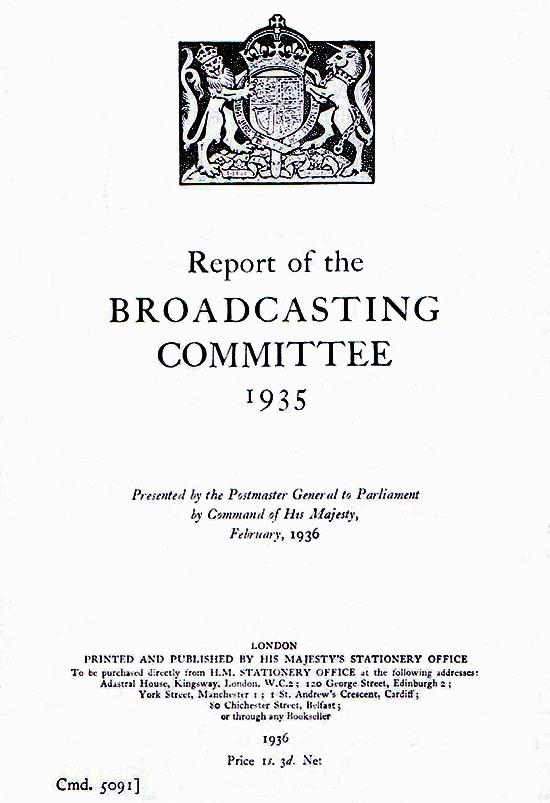
The Ullswater Report ( 1935 ) Government Intervention.
rediffusion.info


The first exchanges were licensed by the Post Office in 1927; five years ago there were about 60 Exchanges with about 14,000 subscribers; there are now approximately 340 Exchanges with more than 200,000 subscribers.
The system appeals specially to those who find wireless reception difficult or who wish to avoid the expense of buying, or the trouble of looking after, a wireless set. It requires at the receiving end, a loudspeaker only. Each subscriber must take out an ordinary broadcast receiving licence and the charge made for this service is usually about 1s 6d a week if the subscriber provides hs own loudspeaker. For an additional charge a loudspeaker can be obtained on hire-purchase from the relay exchange company, whose agents call periodically to collect rents and dues.
The licences first granted for relay exchanges were terminable at the end of 1932. Since then new licences and extensions up to 31st December 1936 have been given, but the power to terminate the licence has been reserved in order that future policy may be entirely unfettered. The licences include express provision that on their termination
the Postmaster General may require the licensee to sell him such portions of the plant and apparatus as he may specify, at a price "equal to the value thereof at the date of purchase as plant and apparatus in situ exclusine of any allowance
or compensation for loss of profit compulsory sale goodwill the cost of raising capital or any other consideration." Thus all existing relay exchanges are, with the full cognisance of their proprietors from the start, liable to termination of license and expropriation at the end of 1936.
We recognise a considerable public value in the system provided that it conducted under conditions that will ensure its development in the public interest.
1936 was one of the many years of uncertainty which have clouded the horizons of the relay industry for periods throughout its existence, because the licences under which relay services operated were due to expire at the end of the year. The situation was
summed up in the first edition of the Rediffusion Technical Bulletin along the following lines:
‘The relaying of broadcast radio programmes was introduced into Great Britain in about 1928, and the number of subscribers among all companies increased to around a quarter of a million by the end of 1936.
The Government appointed the Ullswater Committee to investigate the position of broadcasting and broadcast relay services, and its report, issued in March 1936, recommended that the relay services be taken over by the Post Office. The matter was debated at length in Parliament and in June 1936 there was issued a Government White Paper extending the licence of relay services until December 1939 and instructing the Post Office to carry out technical and practical experiments during this three-year period and to make recommendations regarding the future
of relay operations.
It is known that the Post Office have been experimenting and after considering various methods such as those used by ourselves and other relay systems, it is rumoured that only two methods are to be investigated further. One of these is similar to our own a.f. distribution except that it is reported that the Post Office propose to distribute four programmes (one of which, according to speculation, would be a speaking clock!) and all main feeders are to be underground.’ (Note — at this time Rediffusion were providing two programmes, almost entirely by overhead wiring.) ‘The second method to be considered is an r.f. carrier system and four programmes are to be superimposed on the existing telephone system or on a specially constructed network. This method involves a demodulator at the subscriber’s end and in effect the subscriber has a radio receiver with fixed four channel tuning but without an aerial. The need for a power supply, valve replacement etc. will present difficulties akin to the domestic radio receiver.
According to press reports the Post Office are to carry out their first practical experiments at Southampton.
In the meantime, Rediffusion companies have had to cut down the development of new areas very considerably and no substantial increase in the number of subscribers can be expected in the near future.
Some other relay companies have gone in for the sale and rental of radio receivers. Our Group has decided against this but we are doing all we can to continue to give the best possible service to our subscribers.
In the districts where we already operate, several schemes for improving distribution, network and equipment have been and are being carried out since the Ullswater Report was issued, but no new areas are being developed.’
It ultimately transpired that, under the threat of war in 1939, the Postmaster General granted an extension of relay licences and the Rediffusion Group celebrated by giving a bonus of two weeks’ wages to all staff with more than six months’ service.
Front Cover of the report.
Relevant text extract from the report.




